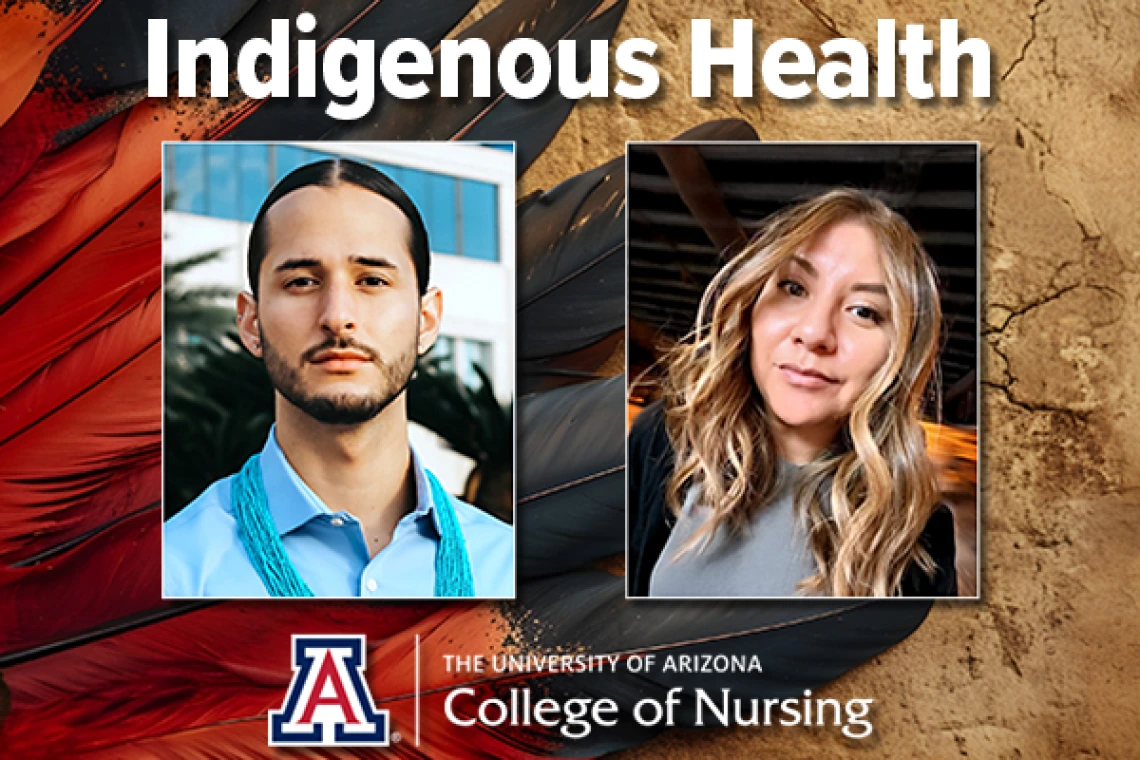Advancing Indigenous Health: College of Nursing students honored at N-NURSE symposium

Left: Jesse Johnson, MEPN student. Right: Reanna Draper, DNP student.
The College of Nursing proudly celebrates Master of Science, Entry to the Profession of Nursing (MEPN) student Jesse Johnson and Doctor of Nursing Practice (DNP) student Reanna Draper for their outstanding academic achievements, leadership, and commitment to advancing Indigenous health. Both students were honored at the 11th Navajoland Nurses United for Research, Service, and Education (N-NURSE) Symposium.
The Symposium was held from November 5–7, 2025, at the Indian Pueblo Cultural Center in Albuquerque, New Mexico. This year’s theme, “Indigenous Pathways to Maternal and Child Health,” brought together Indigenous health leaders from across the country to explore ways to connect Indigenous and Western approaches to maternal and child wellness. Over three days, participants discussed social, environmental, and structural factors affecting health while sharing cultural, clinical, and policy strategies that promote safety, justice, and better outcomes for Indigenous families.
The honor was very meaningful for both Johnson and Draper. Draper said, “Attending the symposium was a great opportunity to learn about research and projects occurring around the Navajo land, as well as a great networking event. As a future DNP Family Nurse Practitioner, I plan to work with Indigenous populations on or near tribal lands. So, it was great to see and meet all the amazing people working toward increasing health access while reinforcing tribal cultural safety.”
Johnson expressed a similar view: “The N-NURSE Symposium deepened my appreciation for lifelong learning in nursing. It was a reminder that our growth as nurses directly impacts the communities we serve.”
Their dedication is evident every day within the College of Nursing. Johnson supports fellow students by boosting confidence and promoting a sense of belonging, while also participating in community health outreach efforts that highlight Indigenous perspectives in care. Draper manages the demands of a doctoral program alongside work, family, and community service, demonstrating a holistic approach to nursing grounded in culture, wellness, and compassionate care. Together, they exemplify the next generation of Indigenous nurse leaders dedicated to strengthening the communities they serve.
Both students engage in Indians in Nursing: Career Advancement and Transition Scholars (INCATS), a College of Nursing program designed to grow the Native American nursing workforce. Whether students are beginning with a BSN or advancing toward doctoral practice, INCATS offers structured pathways to leadership through culturally responsive support, mentorship, and tribal–academic–practice collaborations that enhance care for Native populations.
College of Nursing dean Brian Ahn, PhD, highlighted their impact. “Johnson and Draper demonstrate how Indigenous knowledge, community connection, and advanced nursing education can come together to improve health for Native families. Their work reflects a deep respect for community priorities and a commitment to strengthening the Indigenous health workforce. We are proud to support their journeys and to learn from the perspectives they bring to our college.”
Timian Godfrey, PhD(c), DNP, FNP-BC, FWAN, FAAN, associate clinical professor and director of INCATS, praised both students: “Johnson is an exceptional Native nursing student and emerging scholar whose dedication to mentorship and community outreach exemplifies the values of Indigenous leadership in health care. He brings a deep respect for cultural knowledge and intergenerational learning to his work, fostering trust and connection among peers and community members alike.”
On Draper’s contributions, Godfrey stated, “Draper is an outstanding Native DNP student whose resilience and dedication inspire those around her. Her leadership reflects an unwavering commitment to advancing Indigenous health equity and expanding access to culturally responsive care.”
The symposium featured sessions that promoted open dialogue, mentorship, and collaboration among Indigenous and non-Indigenous health professionals. A highlight of the event was the Honoring Banquet, where attendees like Johnson and Draper were recognized for their leadership, service, and contributions to advancing Indigenous health.
Events like the N-NURSE Symposium also emphasize the importance of ongoing professional development. The Indian Health Service (IHS) Clinical Support Center, the organization that accredits the event, is jointly accredited by the Accreditation Council for Continuing Medical Education (ACCME), the Accreditation Council for Pharmacy Education (ACPE), and the American Nurses Credentialing Center (ANCC) to provide continuing education across health fields.
As Johnson and Draper advance in their academic and professional careers, their accomplishments highlight the growing influence of Indigenous nurses and the vital role they play in enhancing health outcomes for Native communities. Their participation in the symposium represents a future shaped by Indigenous expertise, leadership, and cultural knowledge, supported by programs like INCATS that prepare students to make meaningful, lasting contributions to health care.

